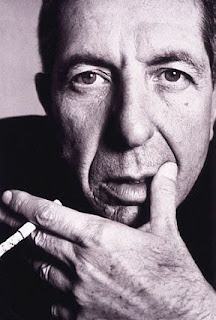Leonard Cohen
 I don't think I became fully cognizant of Leonard Cohen until his great 1988 album, I'm Your Man. I ended up seeing him at Carnegie Hall during his tour for that record. Over the years he's come and gone from my radar, but I made a wise purchase of a two-disc collection called The Essential Leonard Cohen, and have listened to it several times over the past few weeks.
I don't think I became fully cognizant of Leonard Cohen until his great 1988 album, I'm Your Man. I ended up seeing him at Carnegie Hall during his tour for that record. Over the years he's come and gone from my radar, but I made a wise purchase of a two-disc collection called The Essential Leonard Cohen, and have listened to it several times over the past few weeks.Many academics dismiss the idea that rock lyricists, such as Bob Dylan, could be considered poets. Well, Leonard Cohen was a poet and novelist for over ten years before he ever recorded a song. Many of his early works were better known for being covered by other artists, such as Judy Collins' version of "Suzanne." Those early 1960s songs, sung in Cohen's flat baritone, had some echoes of Dylan, mixed with Fairport Convention. The lyrics could be a bit twee: "Suzanne takes you down to her place near the river/You can hear the boats go by/You can spend the night beside her/And you know that she's half crazy/But that's why you want to be there/And she feeds you tea and oranges/That come all the way from China."
But the songs from his early days, even if they are overly precious, still have a certain nostalgic power. In addition to "Suzanne," I like "Famous Blue Raincoat," "Sisters of Mercy," "So Long Marianne," and "Hey, That's No Way to Say Goodbye." His second album, from 1969, featured "Bird on a Wire," which managed to become a title for an otherwise forgettable Mel Gibson-Goldie Hawn film, and "Chelsea Hotel #2" was about his love affair with Janis Joplin.
Somewhere along the line Cohen changed. His voice became deeper and raspier, perhaps from cigarettes, perhaps from an overwhelming sense of doom, as his lyrics took on an apocalyptic quality. Perhaps his most famous song is "Hallelujah," full of Biblical references, and covered by a variety of artists (k.d. Lang sang it during the 2010 Winter Olympic opening ceremonies--both are Canadian). Then came I'm Your Man, in which his sound incorporated synthesizers and female back-up singers--he was like the anti-Vegas lounge act. Several of the songs from that album are on the Essential Collection, including the title song and the whimsical "Tower of Song," in which he playfully sings, "I was born like this, I had no choice/I was born with the gift of a golden voice," punctuated by what sounds like a toy piano.
The album's opening number, "First We Take Manhattan," sounds like some sort of fascist manifesto, with ominous lyrics like "I'm guided by a signal in the heavens/I'm guided by this birthmark on my skin/I'm guided by the beauty of our weapons/First we take Manhattan, then we take Berlin."
But my favorite song on the album is "Everybody Knows," which drips with cynicism. "Everybody knows that the war is over/Everybody knows the good guys lost/Everybody knows the fight was fixed/The poor stay poor, the rich get rich /That's how it goes/Everybody knows."
Cohen's next album, The Future, seemed even bleaker, considering the refrain in the title song is "I've seen the future, brother: it is murder" In "Democracy," he sardonically sings "Democracy is coming to the U.S.A. /It's coming through a crack in the wall; /on a visionary flood of alcohol;
/from the staggering account /of the Sermon on the Mount/which I don't pretend to understand at all. /It's coming from the silence /on the dock of the bay, /from the brave, the bold, the battered/heart of Chevrolet: /Democracy is coming to the U.S.A."
Since then I haven't kept up with Cohen's work, though, at 76, he still records and performs. Though he's probably best termed a cult figure rather than a popular success, he's widely respected in the music industry, and was elected to the Rock and Roll Hall of Fame. If you're unfamiliar with his work I recommend you rectify that posthaste.


Comments
Post a Comment